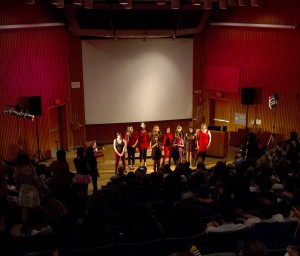It’s hard to find a production as controversial as “The Vagina Monologues.” It has been banned by dozens of college campuses, the subject of hundreds of critical news stories, and the ire of right-wing and left-wing groups alike. This past Saturday, Feb. 23, an all-female cast of 20 UR students performed “The Vagina Monologues” in Hubbell Auditorium, wowing audience members with their poignancy, comedy, and diversity.
The show is performed annually around the world as part of the global activist movement “V-Day.” Acknowledged in over 130 countries, V-Day’s mission is to raise awareness about violence against women and how to prevent it. “The Vagina Monologues,” though incredibly humorous, is also informative. Out of the 17 monologues performed, six featured serious subject matter. Three separate monologues were focused on rape. Among these was one of the best-written monologues of the night, entitled “My Vagina Was My Village,” inspired by the accounts of multiple Bosnian women who were victims of sexual violence. The monologue was enhanced by emotional performances from senior Janixa Mejias and junior Leslie Johnson.
“The Vagina Monologues” has been accused of being overly feminist, but using this sociopolitical term does little to capture the subject matter addressed in the production. While some of the monologues were definitely in the interest of pure entertainment, it was the intellectually stimulating ones that seemed to have the biggest impact on the audience. The best example of this was the monologue “The Little Coochi Snorcher That Could,” which was performed with exceptional skill by junior Siobhan McLaughlin. The monologue addressed the everlasting effects of traumatic sexual experiences from her youth, and how she was able to eventually come to terms with her sexuality in a conservative, repressive household in the 1970s.
Though the production is supposedly catered to women due to its subject matter and its feminist roots, a large number of men attended the event, making up about 35% of the audience. For the most part, they seemed to love the show as much as their female counterparts. “I absolutely enjoyed the show…it was both very comical and enlightening,” said freshman Eugene Rohrer. Many of the men who came out of the show echoed this sentiment, also commenting on how much more comfortable they became with the subject matter as the performance progressed. The only exception seemed to be the short monologue entitled “Not-So-Happy Fact,” which breached the topic of genital mutilation, something that left many audience members uncomfortable due to the blunt delivery of the brutal facts associated with a practice relatively unknown to the Western world.
Some of the show’s strongest performances appeared in an eleven minute monologue called “The Woman Who Loved to Make Vaginas Happy.” Performed by Sophomore Samantha Whalen, the act is commonly nicknamed the “Moanalogue” due to its subject matter: Whalen’s character is a sex worker who is obsessed with the female orgasm. Whalen was able to immerse herself in the role, creating a serious atmosphere then immediately afterwards making the audience break down in laughter with her descriptions of the moans her character had made other women experience. For the final three minutes of her performance, Whalen acted out dozens of different moans, with each successive one more creative and entertaining than the last. The audience reacted to her performance with thunderous applause – hers was almost unanimously considered one of the best monologues of the night.
Arguably the funniest of the monologues from the production was a seven-minute rant entitled “My Angry Vagina.” Seniors Christine Trahms, Carolyn Magri, and Katie Pieper spoke of their dislike for tampons, OBGYN visits, thongs, and other injustices delivered against vaginas. Though it may not seem like comedic subject matter, the scripting and acting in the scene, especially in Magri’s portion, kept the audience in a constant state of laughter.
Overall, it was hard for anyone not to enjoy “The Vagina Monologues.” Among the dozens of performances I have seen as a UR student, there has never been any as powerful or amusing. The contrasting monologues and strong performances from the entire cast, buoyed by the brilliant directing of junior Donna Campbell and sophomore Sara Lewis, allowed the 90-minute performance to pass by almost unnoticeably. The quiet attentiveness of audience members and their loud applause after each scene created an atmosphere that is rarely found in a collegiate production.
A monologue is a powerful thing. When delivered on stage, an actor or actress is able to speak freely without interruption while the audience can do little more than soak it up and listen. “The Vagina Monologues” is powerful not just for the joy it brings to the audience, but the introspection that it forces upon us with its heavy themes. Sophomore Savannah Benton, one of the actresses in this year’s production, summed it up best. “‘The Vagina Monologues’ makes you think about what it means to be a woman,” she said. “It forces you to realize a lot of subtle things in our culture that are geared towards demeaning women.” Every UR student should see “The Vagina Monologues” before they graduate, not only because of its entertaining and emotionally powerful subject matter, but to support V-Day’s attempts to end violence against women and to help promote a more just and fair society.
Pascutoi is a member of the class of 2015.

